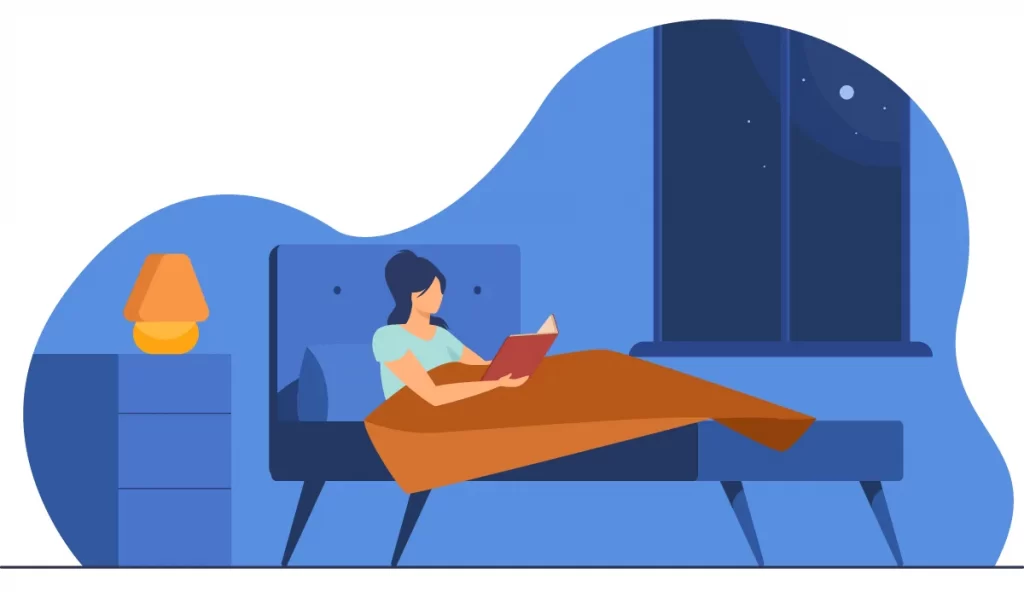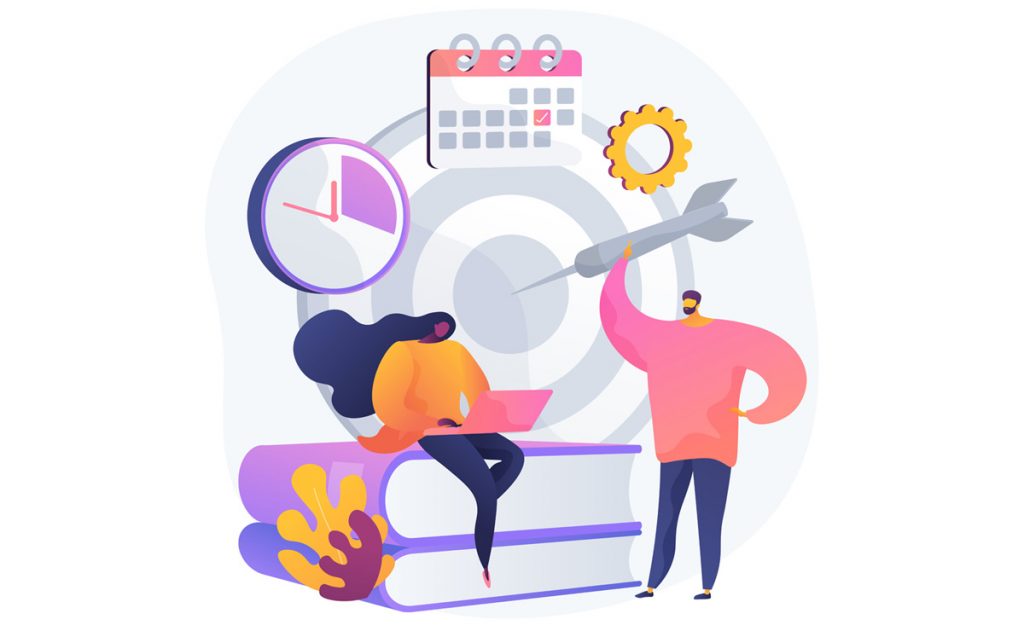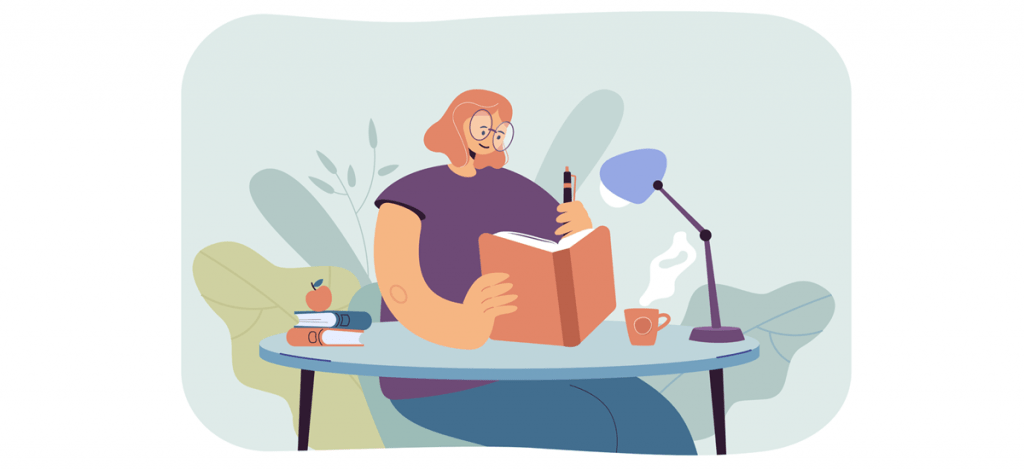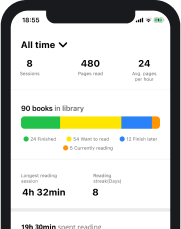The importance of healthy reading habits in our lives goes way beyond the “visible spectrum” of benefits we get from reading books. While the obvious effects of reading include better knowledge, stronger learning abilities, and various other benefits that are related to intelligence, reading also brings other subtle improvements in our lives in areas we wouldn’t normally even think about.
Reading is considered one of the healthiest things you can include in your daily routine, with effects ranging from stress relief, blood pressure and BPM decrease, enhanced imagination, better emotional intelligence, and better sleep.
Does reading before bed help you sleep better? That’s the answer the team from Basmo has benn looking for, and we finally found it!
Does reading before bed help you sleep?
Considering the numerous health benefits of reading, which also include some important ones for our mental health, like relieving stress, it would be somewhat surprising to find out that reading does not help us sleep better. Even though we all experienced it and there was a general consensus in the scientific community regarding the improvements reading can bring to our sleep, a study performed in 2021 finally confirmed without a doubt that reading before bed does have a positive effect on our sleep.
To be more precise, a whopping 42% of the participants in the study claimed to have had better, more restful sleeping patterns after integrating reading into their bedtime routine.
Of course, there are a couple of things we need to take into consideration when reading to sleep. We need to make sure that we read in the right position and to be careful how we choose the book and the medium we read. A book that is too engaging or scary, one that keeps you on the edge of your seat trembling with anticipation may have an effect that is actually opposite to the one you are hoping for, keeping you up all night.
Is it good to read before bed?
Even if better sleep is not on your wishlist and you are perfectly happy with the current quality of your sleep and the amount of rest you’re getting on a nightly basis, it’s important to understand that reading can do a lot more good than that when done at bedtime.
As long as you follow a couple of simple rules I will be expanding on further below, reading before bed can bring you the following benefits:
- Stress relief
- Anxiety relief
- Can help alleviate symptoms of depression
- It can make you more creative
- It can make it easier for you to concentrate
- Better retention of information
- Increases empathy
Admittedly, some of the above are quite general benefits we get from reading regardless of the time you choose to read, but many of them work better before bedtime.
How does reading improve sleep?
There are various ways for reading to improve our sleep, as long as we do it correctly. How we choose to enjoy a book before sleeping does have an impact on the efficiency of using reading as a sleep-improving tool, and does affect how well-rested we wake up the next morning. But since we will be covering the ways you should not use reading before sleep a bit later, let’s first have a look at how reading can improve our sleep.
Books help you relax your body and mind
It’s a well-known fact that reading is a great relaxation and stress-relief tool. Studies have shown that as little as 6 minutes of reading can reduce stress levels by no less than 68%. Not at all surprisingly, less stress means better sleep.
That is not all though, as reading before bed also has a physical effect on your body, by decreasing your blood pressure and heart rate, which also equates in the end with falling asleep a lot quicker and getting better rest.
Reading improves your dreams
While the connection between reading and dreaming hasn’t been deciphered completely by scientists yet, the general consensus seems to be that the books you read during bedtime do have an effect on the intensity of the dreams you have while you sleep. As we all know, dreams occur in the REM sleep cycle, one that has significant importance in sleep quality.
A night of vivid dreams is usually an indicator of restful sleep, even though exceptions do exist. And since reading before sleep can put you in a more creative and imaginative state of mind, forcing you to recreate the things you are reading about in your mind’s eye, chances are that a good fiction reading session before sleep will result in more emotionally intense and interesting dreams.
The only logical conclusion would be that since books enhance your dreaming, and dreams are an indicator of a good night’s sleep, reading improves your sleep.
Keeps you away from the dreaded blue light
The negative effects of blue light have been thoroughly studied in the past years, and one of the most important ones to take into consideration is how blue light affects your sleep. Staring at your phone screen exposes you to the blue light emitted by it, which affects your circadian rhythm, signaling your brain the opposite of what is actually supposed to be happening: blue light triggers a “wake up” response in your brain when in fact it should start winding down and preparing for a night of restful sleep.
Books, as long as you don’t read them on your phone or tablet (which is strongly advised against), will keep you entertained without exposing you to blue light. If you dim down your lights to a comfortable level, reading before sleep will put your brain in the exactly correct state, allowing it to wind down and relax.
Reading helps you create a healthy bedtime routine
We are all creatures of habit, regardless of how different we are from one another. Routines, schedules, and generally being organized have a hugely positive effect on every aspect of our lives.
Having a routine makes pretty much any of our activities more enjoyable and usually more productive. Falling asleep is no different. Whether we realize it or not, we all have a certain bedtime routine we keep repeating day after day, even if not all of us follow it step by step every time.
Including reading in your bedtime routine will add more structure to it and it will help accustom your brain with a couple of steps that indicate it is time for a well-deserved temporary shutdown (getting changed in our pajamas, brushing our teeth, and reading for 15 minutes for example). Our brain will learn these steps and will understand their order and what happens after the routine is completed, making it a lot easier to fall asleep quicker.
Reading fiction makes us more empathic
Studies have shown that reading fiction improves empathy and if you think about it, one of the most important things you need to have in order to get a good night’s sleep is inner peace. Using reading as a tool for increasing empathy will allow us to be more content, to understand others better, judge people less often and less harshly, which, in the end can only bring us serenity and a level of mindfulness and inner peace that can only improve our mental health and our sleep.
How not to read before bed?
As I mentioned earlier, here at Basmo we found that despite the numerous benefits of reading before bed, there are ways you can do it wrong. Of course, the advantages of reading before sleeping clearly outweigh the possible negatives, but it is still good for you to know how you can improve on this amazing habit. Yes, you can improve on perfection.
- Don’t read lying down: even though it may sound somewhat odd, reading while lying down is usually not ideal, and that goes for reading before bed. Even if you do read in bed before falling asleep, you should do it in an upright position, with your back rested against your pillow. That way you avoid putting any strain on your muscles, joints, and eyes.
- Don’t read on your phone: as I mentioned earlier, blue light before falling asleep is a big no-no. If you read before falling asleep, you should choose paperback books or e-readers with low or no backlight. Using your phone or tablet to read before sleeping might do you more harm than good.
- Don’t read books that are too scary or engaging: we know very well what it’s like to read a page-turner. And trust me, that is not the kind of book you want to read before falling asleep. Chances are you will end up falling asleep much later than you were planning. The same goes for horror books that give you shivers down your spine. You may find out the hard way that turning off the lights is not as easy to do as you thought, and neither is falling asleep, after reading a Stephen King novel for example.
Create healthy reading habits with Basmo
Now that you know what you shouldn’t do, let me tell you what can take the process of reading to help you sleep to a whole new level of efficiency: Basmo.
Basmo is the most complex reading tracking app you will be able to find on the market today, and an incredibly valuable reading companion. The app has been designed to aid the modern reader to increase efficiency, create healthy reading habits, and ultimately, to learn to love reading even more than ever before.
If you want to start reading before falling asleep in order to improve on the amount of rest you are actually getting, here’s how Basmo can help:
Create special reading lists
As I mentioned, reading before bed should be reserved for books with a low impact on your level of excitement. To avoid starting a book you won’t want to put back down, we recommend using the reading lists feature from Basmo – it will allow you to create countless personalized lists, and populating your “before bed” reading list with titles that are appropriate will be extremely easy.
Create your own schedule
Having a clear sleep schedule is essential for a healthy lifestyle. Pairing your bed time with your nightly reading sessions is going to be easier than ever considering that Basmo gives you the option to create a personalized schedule for your reading. Simply select the days of the week you want to read before bed and the time your reading sessions should take place and the app will even notify you when it’s time for your bedtime reading session.
E-readers vs paper books vs audiobooks before bed
Choosing the right medium for your reading before bed can be challenging. The choices are quite varied these days, but the good news is that as long as you’re not reading books on your phone, tablet or other device emitting blue light, there’s very little that can go wrong.
Paperback books are the obvious first choice, since the return to traditional reading ways usually has a positive effect on our body and mind. Yes, they take up some room on your nightstand and collect dust, but you can’t really go wrong reading paperback before going to sleep.
E-readers are just as efficient though, as long as you choose one with dimmable backlight and a black and white screen.
Audiobooks have been found to also have a positive effect on the quality of our sleep and the time it takes us to fall asleep. If reading in bed is simply not your thing, go for an audiobook. Listen to it at a low volume until you fall asleep and you can reap some pretty amazing benefits.
Reading to children before bed?
YES. Countless studies have shown the positive effects of reading to our children before bedtime. Children who enjoy a daily bedtime story time are happier, healthier, develop quicker and better, and also grow up to be passionate readers, which helps them even more further in life.
There is no reason to avoid reading to your child before bed and a million reasons to do it.
Final thoughts
So, does reading before bed help you sleep better? As long as you do it the right way, eventually also using Basmo, reading is guaranteed to improve the quality of your sleep, enhance the intensity of your dreams, increase the amount of rest you’re getting, and help you fall asleep quicker.
Give Your Reading Experience
An Extra Boost With Basmo
Track the books you read, monitor the time you spend reading and keep notes on your reading habits and how it makes you feel. You can set yourself targets for the time you spend reading and you can get notified whenever you’re behind on your reading time.







